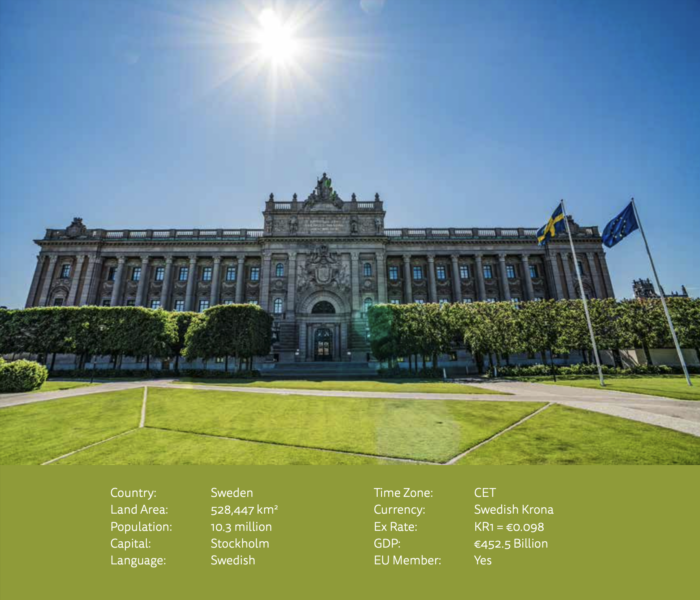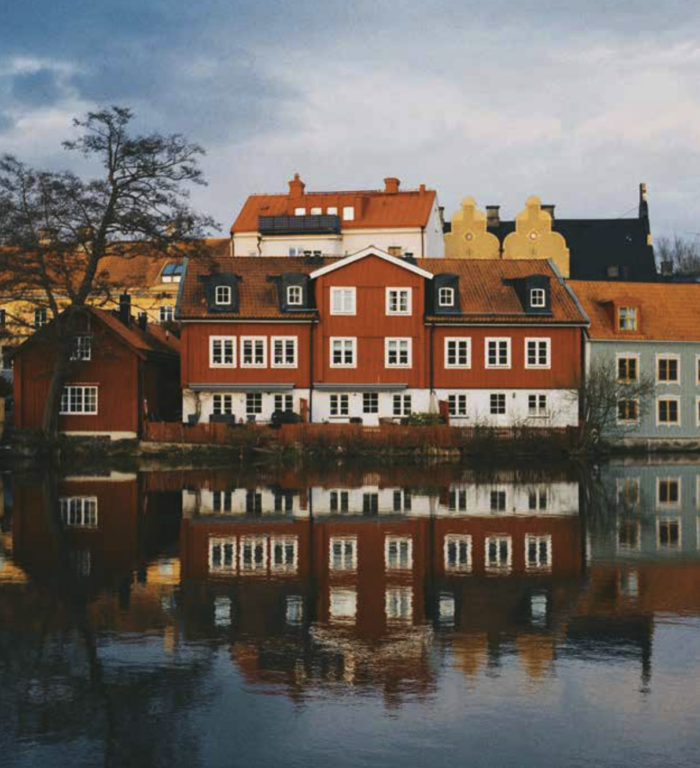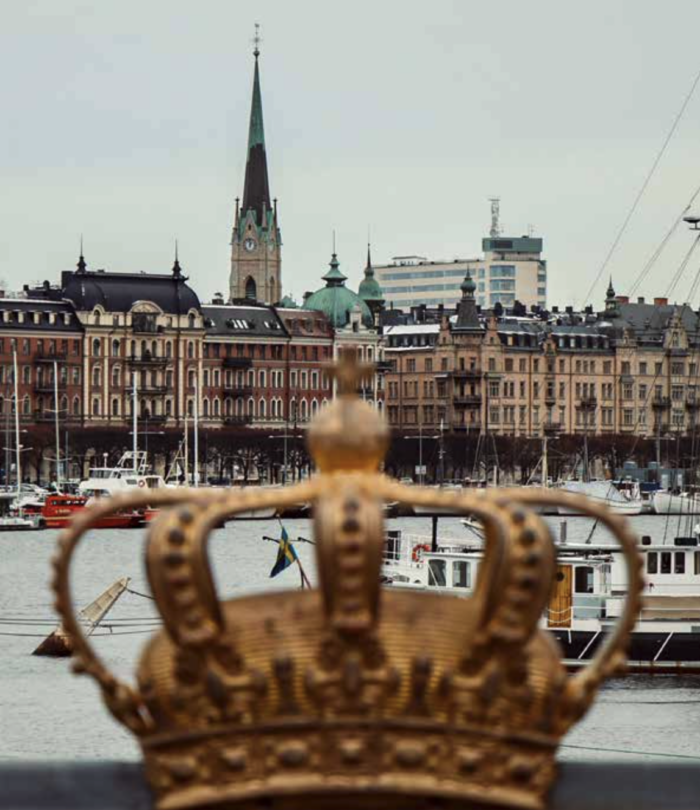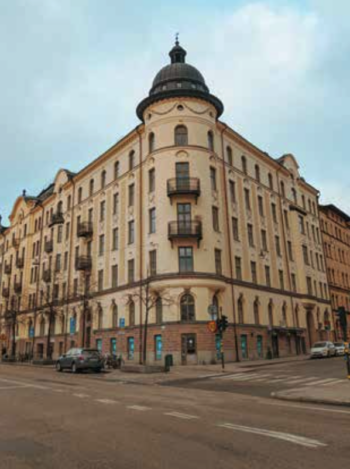In the 16th century, there was an attempt to restore the Kalmar Union, which consisted of Sweden, Denmark, Norway and Finland but the fight to stay independent was led by Gustav Vasa. He established the foundation for today’s modern Sweden and also broke from the Catholic Church with the Reformation.
Sweden declared itself neutral during both world wars and thus avoided a lot of destruction and structural damage. In addition, it profited massively from a great demand for raw materials and foodstuffs and the disappearance of international competition for its exports.
Today Sweden enjoys a high standard of living under a mixture of high-tech capitalism and extensive welfare benefits. Sweden joined the European Union in 1995 although it did not adopt the Euro after a referendum on the matter in 1997.
Principal Industries in Sweden
Sweden’s primary industries include timber, hydropower and iron ore.
Other Important Industries
Sweden is well-known internationally for motor vehicles, telecommunications and home goods but they’re also active in defence, aerospace, pharmaceuticals and precision engineering.
Doing Business in Sweden
Sweden’s strong and stable economy make it an extremely attractive option for foreign investment. With some of the lowest corporate taxes in the EU, a high score on the World Bank’s Doing Business Report and an open economy, it has to be kept in mind if you are considering moving to a new territory.
Sweden’s economy is geared for innovation and competition. The government proactively invests to promote growth in sectors such as biotechnology and food processing and works to support trade in growing markets, including the Baltic countries, India, and Brazil.
With the health of the economy, great government assistance and an innovative culture, it will come as no surprise that Sweden is a hot spot for start-ups. There are already major technology companies in Stockholm and Gothenburg, and Sweden is second only to Silicon Valley for having more billion-dollar firms headquartered in the region per capita.
The real value of Sweden for a start-up or scale-up though is that being a smaller market, Sweden is the ideal location to test the appetite for new ideas and products before rolling them out into larger markets.
The View from the Ground
When describing a country and its culture, you can write down all the facts and figures you like but if you want the full story, you need to get the perspective of someone with a lived experience of being there. That’s why we’ve asked Eva to give us her take on what it’s like to live and work in Sweden.
Sweden is very consensus driven and there are a lot of people involved in decisions from different departments and levels. It’s a flat organisational structure. This means the sales cycle can sometimes be a long one because everyone has to be heard and everyone has to agree that this is the right decision. There is even a codetermination law in bigger companies where representatives from the workers on the board need to have a say in bigger decisions.
The Swedes are not particularly direct or forthright. They do not like conflict and perhaps this ispartofthereason,alongwithstronggenderequality,thatthereisnotaparticularlymasculine or macho office culture. In a business meeting, you’ll start with a firm handshake but in the second meeting, it may be a friendly hug, even between male colleagues. Business gifts are not common in Sweden, as people are wary of being accused of offering a bribe and with strict regulations, gifts over a certain value would have to be taxed.
Parental leave in Sweden is 1 and a half years, with 3 months dedicated to the father. In fact, at one company I was with, the CEO took 3 months off for parental leave. It’s also quite normal for people to leave work at 4 o’clock to go and pick up their kids from school. There is a state benefit in Sweden that if you have to stay at home because of a sick child, the government pays 80% of your salary. It’s also not that uncommon for somebody to be missing from a meeting because they’re tending to a sick child. Despite this, business continues to thrive as the situation is seen as normal that it doesn’t create any huge drama. These rules were created by politicians in the 60s so it is very deeply rooted into society.
It’s much easier in Sweden for women to have a career. Everyone I know in Sweden is still working full-time although this is because childcare is so good, affordable and it’s very much in the mindset. In other countries, people work part-time and are shocked to find that you’re working full-time – “but you have two kids how do you do it?” Whereas in Sweden, this would be perfectly normal. In other European countries, kids have to be left with the grandparents all the time, so in Sweden it’s easier. Right now, I’m the only woman on the sales manager team because I’m working full-time but if you make the choice not to focus on your career, then it’s obviously difficult to grow. You cannot work three days a week and have a management position. That’s going to be difficult but in Sweden it is not an issue at all. What’s more, a lot of companies are trying to get a more equal board. It’s obviously not 50/50 but I know a lot of companies where they have a lot of women in strong political positions, so I think it is improving and I think it’s one of the most equal countries in the world along with the other Nordic countries. I think this is down to the whole mindset and also the fact that we had the strong union backgrounds with employee rights and so it has helped with that. You do pay a lot in tax, of course, but that gives people security, they feel safe in their position and that’s helps with their creativity as you can see in the many super successful tech companies and start-ups that we have.
Work life balance is very important in Sweden, even for the c-suite. So, being on time for meetings and ending them when they should end is important. You need to be respectful of other people’s time.
Among the Scandinavian countries, Sweden gets along with everyone else. In fact, real one- upmanship only comes to the fore when there’s sport on. This is particularly evident when Sweden and Denmark play football together. Yet, despite that rivalry, Sweden will also support Denmark, providing they’re playing someone else of course.
There are differences even within Sweden in your relations with the Danes. I’m from Stockholm so people think we’re arrogant, it’s not true by the way, but if you live in Malmo, you have a completely different relationship with the Danish than I have because I don’t even understand their language.
Culturally, we have an unwritten law called Jantelagen which means that you shouldn’t think that you’re better than anyone else. That’s why all the Swedes who want to be swish and think they’re the best go and live in the US or somewhere else. As for Zlatan Ibrahimovic, well, he’s a law unto himself. He clearly didn’t understand that you shouldn’t put yourself above others and be bragging and things like that. It’s actually quite surprising that he’s Swedish at all but he is and we’re as proud of him as we are of all our Swedish stars. Look at ABBA, as popular as ever and still going.
We have a lot of public holidays in Sweden, and we really celebrate. The biggest festivities are obviously Christmas on the 24th and Midsummer, which is the longest day of the year. And what do we eat for all the different holidays? Meatballs, that’s all we eat. We also drink a lot of schnapps, which is part of the tradition. I think people are beginning to move away from the strong, strong alcohol now though as it’s not the healthiest approach.
Business Etiquette
The Swedes do not like to waste time, so it would be a good idea to circulate an agenda before every meeting and to stick to it rigidly. Don’t be surprised if deadlines for next steps are agreed upon in a meeting, although as every decision must be made by group consensus, you may need more than one meeting to reach an agreement. When attending a meeting in Sweden, punctuality is of the utmost importance, not just in business, but socially too. Being late is considered the height of bad manners and is very disrespectful to your host.
Be well-prepared when entering negotiations with Swedes; as they are known for analysing information, backgrounds and proposals carefully. It is recommended that you provide your Swedish business partner with lots of information to go through and study. While the Swedes are relaxed and tolerant, they have exacting standards for professionalism and will expect you to do the same. They will also display very little emotion when negotiating, as they consider a deal to be very serious business.






